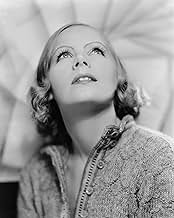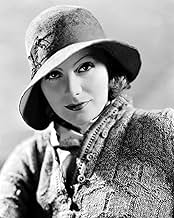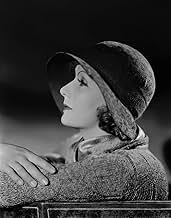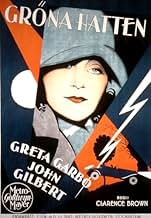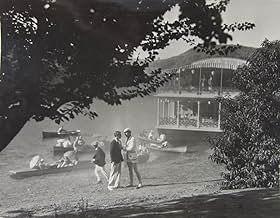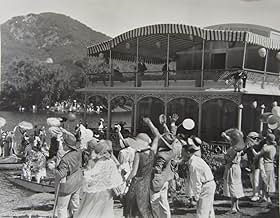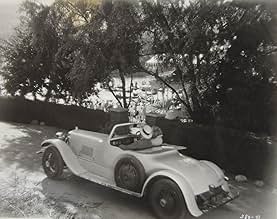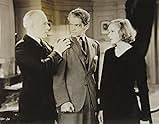VALUTAZIONE IMDb
7,1/10
1820
LA TUA VALUTAZIONE
Aggiungi una trama nella tua linguaWhen two childhood sweethearts are kept from marrying, misery ensues.When two childhood sweethearts are kept from marrying, misery ensues.When two childhood sweethearts are kept from marrying, misery ensues.
- Regia
- Sceneggiatura
- Star
- Candidato a 1 Oscar
- 2 vittorie e 1 candidatura in totale
Johnny Mack Brown
- David Furness
- (as John Mack Brown)
Gertrude Astor
- Party Guest
- (non citato nei titoli originali)
Agostino Borgato
- French Police Inspector
- (non citato nei titoli originali)
F.F. Guenste
- Servant at Davids Death Investigation
- (non citato nei titoli originali)
Sydney Jarvis
- Gendarme
- (non citato nei titoli originali)
Fred Kelsey
- Detective
- (non citato nei titoli originali)
Anita Louise
- Diana - as a Child
- (non citato nei titoli originali)
Alphonse Martell
- French Hotel Concierge
- (non citato nei titoli originali)
William H. O'Brien
- Man Peering Into Room
- (non citato nei titoli originali)
Frank Finch Smiles
- Butler
- (non citato nei titoli originali)
Recensioni in evidenza
A WOMAN OF AFFAIRS (MGM, 1928), directed by Clarence Brown, from the then controversial novel, "The Green Hat" by Michael Arlen, reunites then popular love team of John Gilbert and Greta Garbo in their third collaboration on screen. Initially teamed under Clarence Brown's direction in the highly popular FLESH AND THE DEVIL (1926), followed by LOVE (1927), taken from the Leo Tolstoy's classic novel, "Anna Karenina," Gilbert and Garbo once more star in a silent melodrama about love and tragedy. Unlike their earlier screen efforts, their characters in this story are already acquainted since childhood, leaving no chance of meeting and falling in love, but the difference here is that their relationship is interfered by a third party who happens not to be another lover or spouse. And unlike their earlier two films, Garbo is more the central focus here than Gilbert.
The story begins quite amusingly, finding the wild and merry Diana Merrick (Greta Garbo) driving recklessly down the road in the Mack Sennett Keystone comedy fashion, nearly missing the ditch diggers as she drives over them. Moments later, the characters in the story, the Holderness and the Merricks, are introduced with each passing scene. Diane is a carefree woman who has loved Neville Holderness (John Gilbert) since childhood. She has a brother, Jeffry (Douglas Fairbanks Jr.), a pampered youth who's so bored with his life that his only satisfaction is boozing up with liquor. Jeffry's closest friend, David Furness (Johnny Mack Brown), tries to stop him from his wild and wicked ways, but to no avail. Neville's father, Sir Morton (Hobart Bosworth), disapproves of the Merrick family's way of life. When he learns that his son wants to marry Diana, he manages to send Neville away to Egypt for a few years, in hope that the two will forget one another through the passage of time. Two years later, Diana marries David. On their wedding night, detectives (one of them played by character actor Fred Kelsey) enter their honeymoon suite in France to arrest David on the charges of theft. Before he can be arrested, David ends his life by jumping out the window. To keep David's name clear for decency sake, she secretly sets out to repay the victims of David's past crimes, a deed only known to the family physician, Doctor Hugh Trevelyan (Lewis Stone). Over the next few years, Diana makes the gossip columns as being a widow of many love affairs throughout the world. As for Neville, he becomes engaged to marry a nice young girl named Constance (Dorothy Sebastian), whom, as Diana describes through the title cards, as a girl "whose eyes are so true and clean." But Old Man Holderness, knowing how his son and Diana still feel about one other, continues to keep the scandalous Diana away his son, causing Neville to become like Jeffry, an unbearable alcoholic.
While not as famous by today's standards as FLESH AND THE DEVIL, A WOMAN OF AFFAIRS somewhat predates those "Peyton Place"-type soap-operas or Lana Turner melodramas quite popular during the 1950s and 60s. It also shows that aristocratic families may have all the luxuries that money can buy, but money does not always buy happiness. Douglas Fairbanks Jr.'s portrayal as an unhappy youth who turns to drink, is quite believable, especially when his glassy eyes, uncombed hair almost covering a portion of his eye, with whiskey glass in his hand that at times has him resemble a young John Barrymore. Whether this was intentional or not will never be known. Fairbanks, however, does well with his early screen performance.
Clarence Brown's direction with the Gilbert-Garbo loves scenes do have some bonuses, but are not as "hot" as in FLESH AND THE DEVIL. One scene that stands out is finding Diana, wearing a special ring on her finger, making love to Neville on the couch, with Diana telling him, "I would only take it off for the man I love." The camera then pans down to her hand just as the ring slowly slips off her finger. As for the story itself, it takes place during a span of ten years, yet the characters in the plot don't look any different in the conclusion as they appear in the opening, making the storyline look more as if it takes place in a span of ten months than ten years. The costumes and hairstyles are obviously modern late 1920s, which works out better in the latter portion of the story than the early segments, circa 1918. And although Garbo has that special beauty, especially when properly photographed, she doesn't look particularly attractive in some of those costumes designed for her, mainly when wearing those flapper-designed hats. Essentially a silent movie that was initially distributed in theaters with recorded scoring, one wishes such a score for this film have been used for its current video distribution, which comes with a Thames stereo orchestral soundtrack. The stereo score has its moments, but when it comes to its slow tempo violin playing in some segments of the story, it becomes a real sleep inducer. A WOMAN OF AFFAIRS was remade by MGM in 1934 as OUTCAST LADY starring Constance Bennett and Herbert Marshall. Both versions are available for viewing on cable TV's Turner Classic Movies.
One final note: A WOMAN OF AFFAIRS was one of the 13 feature films presented on the public television series, MOVIES, GREAT MOVIES (Original air date: October 26, 1973), a 50th anniversary tribute to Metro-Goldwyn-Mayer of the silent era, as hosted by Richard Schickel, on WNET, Channel 13, in New York City. Clocked then at 109 minutes, the TCM print differs in scoring and length, either at 98 (Thames) or 91 minutes. (***)
The story begins quite amusingly, finding the wild and merry Diana Merrick (Greta Garbo) driving recklessly down the road in the Mack Sennett Keystone comedy fashion, nearly missing the ditch diggers as she drives over them. Moments later, the characters in the story, the Holderness and the Merricks, are introduced with each passing scene. Diane is a carefree woman who has loved Neville Holderness (John Gilbert) since childhood. She has a brother, Jeffry (Douglas Fairbanks Jr.), a pampered youth who's so bored with his life that his only satisfaction is boozing up with liquor. Jeffry's closest friend, David Furness (Johnny Mack Brown), tries to stop him from his wild and wicked ways, but to no avail. Neville's father, Sir Morton (Hobart Bosworth), disapproves of the Merrick family's way of life. When he learns that his son wants to marry Diana, he manages to send Neville away to Egypt for a few years, in hope that the two will forget one another through the passage of time. Two years later, Diana marries David. On their wedding night, detectives (one of them played by character actor Fred Kelsey) enter their honeymoon suite in France to arrest David on the charges of theft. Before he can be arrested, David ends his life by jumping out the window. To keep David's name clear for decency sake, she secretly sets out to repay the victims of David's past crimes, a deed only known to the family physician, Doctor Hugh Trevelyan (Lewis Stone). Over the next few years, Diana makes the gossip columns as being a widow of many love affairs throughout the world. As for Neville, he becomes engaged to marry a nice young girl named Constance (Dorothy Sebastian), whom, as Diana describes through the title cards, as a girl "whose eyes are so true and clean." But Old Man Holderness, knowing how his son and Diana still feel about one other, continues to keep the scandalous Diana away his son, causing Neville to become like Jeffry, an unbearable alcoholic.
While not as famous by today's standards as FLESH AND THE DEVIL, A WOMAN OF AFFAIRS somewhat predates those "Peyton Place"-type soap-operas or Lana Turner melodramas quite popular during the 1950s and 60s. It also shows that aristocratic families may have all the luxuries that money can buy, but money does not always buy happiness. Douglas Fairbanks Jr.'s portrayal as an unhappy youth who turns to drink, is quite believable, especially when his glassy eyes, uncombed hair almost covering a portion of his eye, with whiskey glass in his hand that at times has him resemble a young John Barrymore. Whether this was intentional or not will never be known. Fairbanks, however, does well with his early screen performance.
Clarence Brown's direction with the Gilbert-Garbo loves scenes do have some bonuses, but are not as "hot" as in FLESH AND THE DEVIL. One scene that stands out is finding Diana, wearing a special ring on her finger, making love to Neville on the couch, with Diana telling him, "I would only take it off for the man I love." The camera then pans down to her hand just as the ring slowly slips off her finger. As for the story itself, it takes place during a span of ten years, yet the characters in the plot don't look any different in the conclusion as they appear in the opening, making the storyline look more as if it takes place in a span of ten months than ten years. The costumes and hairstyles are obviously modern late 1920s, which works out better in the latter portion of the story than the early segments, circa 1918. And although Garbo has that special beauty, especially when properly photographed, she doesn't look particularly attractive in some of those costumes designed for her, mainly when wearing those flapper-designed hats. Essentially a silent movie that was initially distributed in theaters with recorded scoring, one wishes such a score for this film have been used for its current video distribution, which comes with a Thames stereo orchestral soundtrack. The stereo score has its moments, but when it comes to its slow tempo violin playing in some segments of the story, it becomes a real sleep inducer. A WOMAN OF AFFAIRS was remade by MGM in 1934 as OUTCAST LADY starring Constance Bennett and Herbert Marshall. Both versions are available for viewing on cable TV's Turner Classic Movies.
One final note: A WOMAN OF AFFAIRS was one of the 13 feature films presented on the public television series, MOVIES, GREAT MOVIES (Original air date: October 26, 1973), a 50th anniversary tribute to Metro-Goldwyn-Mayer of the silent era, as hosted by Richard Schickel, on WNET, Channel 13, in New York City. Clocked then at 109 minutes, the TCM print differs in scoring and length, either at 98 (Thames) or 91 minutes. (***)
'A Woman of Affairs' had a good deal going for it. It starred the always magical Greta Garbo. It had John Gilbert as her leading man, they always worked beautifully together in the four films they did together (starting with 'Flesh and the Devil' and finishing with 'Queen Christina') and Gilbert. It had Clarence Brown as director, he was not a consistent director as such but he was a sympathetic one with the right material. It had Douglas Fairbanks Jr in a more dramatic role. And it had Lewis Stone, another Garbo regular.
While not a great film as such, 'A Woman of Affairs' is a must for fans of Garbo who gives one of her best silent film performances. This is also a good representation of how well she and Gilbert worked together, and one of her better films with Brown as director. It is not a film for anybody who likes their stories realistic and more subtle, but for beautiful filming, emotional impact and good acting, 'A Woman of Affairs' is definitely worth seeing.
Is it perfect? No, and the story is the weak link. Not in a dull way, but it does get very melodramatic in the latter stages of the film and some parts are not just silly but sense and credulity go out of the window at times. Just didn't buy how some events happen as fast as they do here. The ending is both rushed and contrived.
Part of me did wish too that Gilbert's role was better developed and more interesting. Gilbert does very well with it but deserved more to do.
Garbo though is absolutely enchanting, she looks radiant and her presence is movingly noble and Diana's suffering portrayed with such graceful subtlety. Gilbert does well with what he has and he and Garbo match each other beautifully, never too restrained or overwrought and always sparkling. Stone is sincerely reserved as usual, while Fairbanks gives one of his better serious performances and is quite moving. Dorothy Sebastian sparkles. Brown directs sympathetically, no indifference here, and some of it is quite imaginative, the more symbolic moments not laid on too thick.
Despite the melodrama and silliness, there are many melancholic stretches handled with a lot of sincerity and not heavy-handedness and they come over as genuinely poignant and not over-bleak. 'A Woman of Affairs' is a very well made film and quite ravishingly photographed in the best moments. Carl Davis (known for writing compositions for many silent films much later on) provides a haunting and well fitting score, even if other scores of his for other films did better at enhancing the atmosphere, action etc.
Summing up, worth seeing for Garbo especially but didn't blow me away. 7/10
While not a great film as such, 'A Woman of Affairs' is a must for fans of Garbo who gives one of her best silent film performances. This is also a good representation of how well she and Gilbert worked together, and one of her better films with Brown as director. It is not a film for anybody who likes their stories realistic and more subtle, but for beautiful filming, emotional impact and good acting, 'A Woman of Affairs' is definitely worth seeing.
Is it perfect? No, and the story is the weak link. Not in a dull way, but it does get very melodramatic in the latter stages of the film and some parts are not just silly but sense and credulity go out of the window at times. Just didn't buy how some events happen as fast as they do here. The ending is both rushed and contrived.
Part of me did wish too that Gilbert's role was better developed and more interesting. Gilbert does very well with it but deserved more to do.
Garbo though is absolutely enchanting, she looks radiant and her presence is movingly noble and Diana's suffering portrayed with such graceful subtlety. Gilbert does well with what he has and he and Garbo match each other beautifully, never too restrained or overwrought and always sparkling. Stone is sincerely reserved as usual, while Fairbanks gives one of his better serious performances and is quite moving. Dorothy Sebastian sparkles. Brown directs sympathetically, no indifference here, and some of it is quite imaginative, the more symbolic moments not laid on too thick.
Despite the melodrama and silliness, there are many melancholic stretches handled with a lot of sincerity and not heavy-handedness and they come over as genuinely poignant and not over-bleak. 'A Woman of Affairs' is a very well made film and quite ravishingly photographed in the best moments. Carl Davis (known for writing compositions for many silent films much later on) provides a haunting and well fitting score, even if other scores of his for other films did better at enhancing the atmosphere, action etc.
Summing up, worth seeing for Garbo especially but didn't blow me away. 7/10
This is a beautifully crafted melodrama, well acted and with high MGM production values, but with moral values that nowadays may well be seen as belonging to another planet. Nevertheless once the historical perspective is in place this is still a simple timeless classic, one I've now seen a dozen times over the years.
Very honourable woman falls in love with equally honourable man, much to his even more honourable father's disfavour. You might notice that understanding "Honor" is the key to understanding this film! Garbo and Gilbert were perfect for the roles (making this a lovely bookend for Flesh And The Devil) and both never looked more gleaming beautiful, although Garbo had a few odd costumes along the way. They had a couple of languid clinches, but this time the plot got in the way of these scenes becoming "hot". Lewis Stone had already dropped into his avuncular stereotype here, his was a marvellously hammy but key performance. Everyone undulates their way to a fitting climax and conclusion (although didn't Neville come back into the room to Constance rather fast after Diana told him ---- ?)
All in all one of my favourite silent melodramas, strangely neglected nowadays - or is there no honour left?
Very honourable woman falls in love with equally honourable man, much to his even more honourable father's disfavour. You might notice that understanding "Honor" is the key to understanding this film! Garbo and Gilbert were perfect for the roles (making this a lovely bookend for Flesh And The Devil) and both never looked more gleaming beautiful, although Garbo had a few odd costumes along the way. They had a couple of languid clinches, but this time the plot got in the way of these scenes becoming "hot". Lewis Stone had already dropped into his avuncular stereotype here, his was a marvellously hammy but key performance. Everyone undulates their way to a fitting climax and conclusion (although didn't Neville come back into the room to Constance rather fast after Diana told him ---- ?)
All in all one of my favourite silent melodramas, strangely neglected nowadays - or is there no honour left?
There really was an art to silent film acting. It wasn't just all exaggerated facial expressions. That becomes clear when you see really good silent actors who know exactly how to put across the material.
Greta Garbo and John Gilbert are really, really good, and they sell the melodrama of "A Woman of Affairs" in a way that others couldn't. In the best of circumstances, films this old feel antiquated by today's standards, but "A Woman of Affairs" feels more sophisticated than other films of its type because of the subtle downplaying of Garbo and Gilbert. Garbo creates an actual woman responding to events that feel like they could actually happen to a real person rather than a stock character histrionically reacting to tear-jerking plot devices. She's fascinating to watch, conveying much with the lift of an eyebrow or a small hand gesture. Her performance here makes it clear why she had the stuff to make the transition to sound.
I have to give director Clarence Brown his due as well. There's a fluid, cinematic quality to this film that makes it feel far more mature than pretty much any of the early sound films coming out around the same time. For example, the film that won the Best Picture Oscar in the year of this film's release was "The Broadway Melody," a dreadful early sound film without a brain in its head. Compare that to the mature subject matter of "A Woman of Affairs" -- the homoerotic obsession one man has for another, for starters -- and you can see how much more daring late silents were than early talkies.
Bess Meredyth, credited in the opening titles with "continuity," received an Oscar nomination for Best Writing for her work on both this and another Clarence Brown film, 1929's "Wonder of Women," at the 1928-29 Oscars. This was during the time when the eligibility period for the Oscars was a wonky August 1 of one year through July 31 of the following year, and it wouldn't be until 1934 when the Academy changed the eligibility period to match the calendar year. This was also during that brief window of time when Oscar nominations could site work on multiple films, as Meredyth's writing nomination did.
Grade: A-
Greta Garbo and John Gilbert are really, really good, and they sell the melodrama of "A Woman of Affairs" in a way that others couldn't. In the best of circumstances, films this old feel antiquated by today's standards, but "A Woman of Affairs" feels more sophisticated than other films of its type because of the subtle downplaying of Garbo and Gilbert. Garbo creates an actual woman responding to events that feel like they could actually happen to a real person rather than a stock character histrionically reacting to tear-jerking plot devices. She's fascinating to watch, conveying much with the lift of an eyebrow or a small hand gesture. Her performance here makes it clear why she had the stuff to make the transition to sound.
I have to give director Clarence Brown his due as well. There's a fluid, cinematic quality to this film that makes it feel far more mature than pretty much any of the early sound films coming out around the same time. For example, the film that won the Best Picture Oscar in the year of this film's release was "The Broadway Melody," a dreadful early sound film without a brain in its head. Compare that to the mature subject matter of "A Woman of Affairs" -- the homoerotic obsession one man has for another, for starters -- and you can see how much more daring late silents were than early talkies.
Bess Meredyth, credited in the opening titles with "continuity," received an Oscar nomination for Best Writing for her work on both this and another Clarence Brown film, 1929's "Wonder of Women," at the 1928-29 Oscars. This was during the time when the eligibility period for the Oscars was a wonky August 1 of one year through July 31 of the following year, and it wouldn't be until 1934 when the Academy changed the eligibility period to match the calendar year. This was also during that brief window of time when Oscar nominations could site work on multiple films, as Meredyth's writing nomination did.
Grade: A-
"Garbo had something behind the eyes that you couldn't see until you photographed her in close-up. You could see thought. If she had to look at one person with jealousy, and another with love, she didn't have to change the expression. You could see it in her eyes as she looked from one to the other. And nobody else could do that on the screen." (director Clarence Brown in a 1968 interview).
Perhaps, you may consider it strange of me to quote Brown's memorable words about Garbo under the title of the film which is, most definitely, not the top - famous film with Greta Garbo. Yes, it is true that not many people have seen A WOMAN OF AFFAIRS (1928), comparing its popularity to her other films, like FLESH AND THE DEVIL, NINOTCHKA or GRAND HOTEL. Furthermore, it was not released on DVD in September 2005, on the occasion of her birth's 100th anniversary . Yet, it is one of the most unforgettable films where Garbo's silent performance has a soul throughout. But, at the same time, the movie can also boast marvelous cinematography, great performances from all cast, an interesting content, and the original soundtrack which opens it to a new era of the 1920s cinema, something in between silent and sound films with dialogs.
Let's start from the first aspect, CINEMATOGRAPHY. There are shots in this film that leave such a deep trace in the viewer that it is hard to forget them. I was absolutely astonished when I saw the moment where Diana (Greta Garbo) walks down the hill in the garden. The lighting and camera movement make such an effect that you simply admire the whole moment. The light is directed towards Diana's figure walking quickly but desperately after a bitter conversation with Morton Holderness (Howard Bosworth), an honorable father of her beloved Nevs (John Gilbert). Another brilliant scene is the one with flowers. Diana, recovering in hospital from the shock that she went through, keeps flowers by her side which remind her of Nevs. Soon before he comes to visit her, there is a brilliant shot of Diana lying in bed, in the state of delirium, and looking at flowers. She really has a blink in her eyes and the camera is directed towards her as well the flowers that she is staring at... Terrific, brilliant shot!
The CONTENT of the movie is based on controversial novel by Michael Arlen, THE GREEN HAT. However, I am not going to compare these two since the film can be watched without the knowledge of the book whatsoever. Since the novel entailed a lot of controversial things, the code made the producers change much, even names. What is more, the credits of the film had no information except "from the novel by Michael Arlen," skipping the fact which novel it was. Therefore, the content was so much changed that the film becomes quite a different story. But, a very interesting one. Except for many things worth attention, I particularly like three aspects about the content. Firstly, it shows the psychological struggle between honor and love, reason and emotions. This clash is most accurately presented in Diana - Morton's conversation at the tree when the elderly gentleman wants to stop the "silly boy and girl attachment" between Diana and his son, Nevs. Morton's character is expressed in another moment when he says to his son trying to convince him to give up the relationship "Ten generations are watching you!" Secondly, the content perfectly shows what a passionate love really means. It is not the matter of choice where I say "yes" or "no" but has a deep insight into the psyche of a particular person. Although Nevs is happy with his wife Constance (Dorothy Sebastian), he cannot stop thinking about Diana whom he has known since the light hearted days of childhood. Thirdly, humorous moments make the rather sad content brighter. Some of them may seem dated, but they are funny in a different way. For instance, the wit about lip rouge is not found in films nowadays. Nevertheless, such script may still be amusing.
The PERFORMANCES are absolutely outstanding. It is the third film in which Garbo appears with her real-life love interest John Gilbert and they both give marvelous jobs here. Their relationship is not that intimate and sensual as in FLESH AND THE DEVIL (1926), but it is more "hearty". Garbo gives her best performance when she is hugging the flowers in hospital. She completely opens herself to a viewer and you can read her mind, similarly like in the final shot of her 1933 masterpiece "Queen Christina". Gilbert is an elegant young person who portrays a man divided into two realities - the one of honor and duties and the one of love and dreams. Lewis Stone, a mainstay of most Garbo films (from this one to many others, including GRAND HOTEL and MATA HARI), does a great job as Dr Hugh Trevelyan, who approved of the relationship. Howard Bosworth is magnificent as cruel but honorable Morton Holderness, who disapproved of their relationship. Yet, Dorothy Sebastian gives a delicate performance of a beautiful young wife of Nevs, attempting to be happy and to make other people happy. So with these great performers, you see all of them in the final 10 minute-long scene at Holderness' house, where Diana comes to talk things over with Morton. I don't know how you will react to this, but I consider the scene a masterpiece of silent performances.
All things considered, A WOMAN OF AFFAIRS is a highly recommended film which stands out in our modern era of cinema, as an example of cinematography, performances and well selected content. But it is also Garbo, one of the greatest stars of cinema, about whom one cannot forget when planning to see the movie. Indeed, you can see thought when you look at her face. Garbo ... eternal in cinema!
Perhaps, you may consider it strange of me to quote Brown's memorable words about Garbo under the title of the film which is, most definitely, not the top - famous film with Greta Garbo. Yes, it is true that not many people have seen A WOMAN OF AFFAIRS (1928), comparing its popularity to her other films, like FLESH AND THE DEVIL, NINOTCHKA or GRAND HOTEL. Furthermore, it was not released on DVD in September 2005, on the occasion of her birth's 100th anniversary . Yet, it is one of the most unforgettable films where Garbo's silent performance has a soul throughout. But, at the same time, the movie can also boast marvelous cinematography, great performances from all cast, an interesting content, and the original soundtrack which opens it to a new era of the 1920s cinema, something in between silent and sound films with dialogs.
Let's start from the first aspect, CINEMATOGRAPHY. There are shots in this film that leave such a deep trace in the viewer that it is hard to forget them. I was absolutely astonished when I saw the moment where Diana (Greta Garbo) walks down the hill in the garden. The lighting and camera movement make such an effect that you simply admire the whole moment. The light is directed towards Diana's figure walking quickly but desperately after a bitter conversation with Morton Holderness (Howard Bosworth), an honorable father of her beloved Nevs (John Gilbert). Another brilliant scene is the one with flowers. Diana, recovering in hospital from the shock that she went through, keeps flowers by her side which remind her of Nevs. Soon before he comes to visit her, there is a brilliant shot of Diana lying in bed, in the state of delirium, and looking at flowers. She really has a blink in her eyes and the camera is directed towards her as well the flowers that she is staring at... Terrific, brilliant shot!
The CONTENT of the movie is based on controversial novel by Michael Arlen, THE GREEN HAT. However, I am not going to compare these two since the film can be watched without the knowledge of the book whatsoever. Since the novel entailed a lot of controversial things, the code made the producers change much, even names. What is more, the credits of the film had no information except "from the novel by Michael Arlen," skipping the fact which novel it was. Therefore, the content was so much changed that the film becomes quite a different story. But, a very interesting one. Except for many things worth attention, I particularly like three aspects about the content. Firstly, it shows the psychological struggle between honor and love, reason and emotions. This clash is most accurately presented in Diana - Morton's conversation at the tree when the elderly gentleman wants to stop the "silly boy and girl attachment" between Diana and his son, Nevs. Morton's character is expressed in another moment when he says to his son trying to convince him to give up the relationship "Ten generations are watching you!" Secondly, the content perfectly shows what a passionate love really means. It is not the matter of choice where I say "yes" or "no" but has a deep insight into the psyche of a particular person. Although Nevs is happy with his wife Constance (Dorothy Sebastian), he cannot stop thinking about Diana whom he has known since the light hearted days of childhood. Thirdly, humorous moments make the rather sad content brighter. Some of them may seem dated, but they are funny in a different way. For instance, the wit about lip rouge is not found in films nowadays. Nevertheless, such script may still be amusing.
The PERFORMANCES are absolutely outstanding. It is the third film in which Garbo appears with her real-life love interest John Gilbert and they both give marvelous jobs here. Their relationship is not that intimate and sensual as in FLESH AND THE DEVIL (1926), but it is more "hearty". Garbo gives her best performance when she is hugging the flowers in hospital. She completely opens herself to a viewer and you can read her mind, similarly like in the final shot of her 1933 masterpiece "Queen Christina". Gilbert is an elegant young person who portrays a man divided into two realities - the one of honor and duties and the one of love and dreams. Lewis Stone, a mainstay of most Garbo films (from this one to many others, including GRAND HOTEL and MATA HARI), does a great job as Dr Hugh Trevelyan, who approved of the relationship. Howard Bosworth is magnificent as cruel but honorable Morton Holderness, who disapproved of their relationship. Yet, Dorothy Sebastian gives a delicate performance of a beautiful young wife of Nevs, attempting to be happy and to make other people happy. So with these great performers, you see all of them in the final 10 minute-long scene at Holderness' house, where Diana comes to talk things over with Morton. I don't know how you will react to this, but I consider the scene a masterpiece of silent performances.
All things considered, A WOMAN OF AFFAIRS is a highly recommended film which stands out in our modern era of cinema, as an example of cinematography, performances and well selected content. But it is also Garbo, one of the greatest stars of cinema, about whom one cannot forget when planning to see the movie. Indeed, you can see thought when you look at her face. Garbo ... eternal in cinema!
Lo sapevi?
- QuizMichael Arlen's 1924 novel was turned into a play of the same title, "The Green Hat." It opened on Broadway at the Broadhurst Theatre, 235 W. 44th St., on September 25, 1925 and ran for 231 performances.
- BlooperWhen Diana (as a child) rides her bike into the tree, the cut from the little girl (with short legs and her foot off the pedal) to the stunt-double (with long legs and her foot on the pedal) is obvious.
- Citazioni
Title Card: The widow of David Furness faced a questioning world. Why should a man - happy as David was - take his own life - - ?
- Versioni alternativeMetro-Goldwyn-Mayer also released this picture as a totally silent movie.
- ConnessioniFeatured in Matrimonio all'alba (1951)
I più visti
Accedi per valutare e creare un elenco di titoli salvati per ottenere consigli personalizzati
- How long is A Woman of Affairs?Powered by Alexa
Dettagli
Botteghino
- Budget
- 383.000 USD (previsto)
- Tempo di esecuzione1 ora 38 minuti
- Colore
- Mix di suoni
- Proporzioni
- 1.33 : 1
Contribuisci a questa pagina
Suggerisci una modifica o aggiungi i contenuti mancanti

Divario superiore
By what name was Il destino (1928) officially released in India in English?
Rispondi
